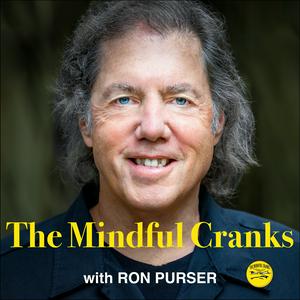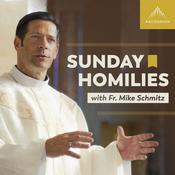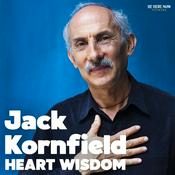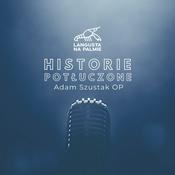50 odcinków

Episode 49 - Tara Isabella Burton- Self-Made
20.07.2023 | 50 min.
I am really excited about the conversation I had with Tara Isabella Burton – who is a novelist, essayist and scholar of religion and spirituality – and we spoke about her new book, Self-Made: Creating Our Identities from Da Vinci to the Kardashians, published by Public Affairs. Tara takes us on a historical tour of the evolution of self-making, that is, how our notions individuality and self-identity formed in response to dramatic social and economic upheavals. Our conversation begins with the Renaissance – and we cover a lot of historical ground, from the aristocratic strands of self-creation during the European Enlightenment -- all the way to our current selfie obsessed and social media influencer culture. Her book is really jammed packed with novel insights and revelations that trace this inward turn to our search for authenticity and how we have come to relocate the source of divinity in our own egoic desires – where our own desires become the source and arbiter of truth and reality. It really is a far-reaching conversation about the crisis of reality in Western culture and the prognosis is, honestly, not good. Tara received a doctorate in theology from Trinity college, Oxford, where she was a Clarendon scholar in 2017. Her first nonfiction book was Strange Rights: New Religions for a Godless World, also published by Public Affairs. She really has been quite prolific. She has published essays in such outlets as the New York Times, The Atlantic, Current Affairs, Literary Hub, Vox, The Plough and many, many more.

Episode 48 - Derek Beres - Conspirituality
14.07.2023 | 1 godz. 9 min.
It would appear that Lululemon-wearing Yoga teachers are worlds apart from gun-toting, far-right Trumper conspiracists. Yet, during the Covid-shut down, when revenues from brick-and-mortar yoga studios dried up - many prominent yoga instructors, as well as wellness influencers who saw big bucks could made in the midst of the vaccine paranoia – these strange bedfellows warmed up to each other! I had the good fortune of speaking with Derek Beres, co-founder of the Conspirituality podcast, which I am a fan of…about his new book by the same name, Conspirituality: How New Age Conspiracy Theories Became a Health Threat, published this month by Public Affairs. In this episode, we barely scratch the surface of this timely and eye-opening book. Derek was deeply immersed and personally invested in yoga communities for many years, and not only this, but health and wellness has been his beat as a professional journalist. From anti-vaxxers and vaccine misinformation, to the paranoia of child-trafficking and the Satanic Panic, to the body fascism of modern yoga and obsession with body purity in the wellness industry, to the pseudoscience, magical thinking of New Age channelers – we unpack some of the main themes that have contributed to the frauds, con artists, hucksters and charlatans – many of which now thrive on social media, with millions of followers. Derek Beres is a multi-faceted author, speaker, and media expert based in Portland, Oregon. He has served in senior editorial positions at a number of tech companies and has years of experience in health, science, and music writing. He regularly speaks on science and media literacy. Derek is the co-host of the Conspirituality podcast. Big Think article.

Episode 47 - Peter Hershock: Buddhism & AI
28.05.2023 | 1 godz. 13 min.
Since the release of OpenAI's ChatGPT earlier this year, there has been a media frenzy – with AI suddenly becoming of mainstream interest and concern. In this episode, I spoke with Peter Hershock, a prolific scholar trained in Asian and comparative philosophy, who has had a long-term interest in the ethical dimensions of our relationship with technology. His latest book, Buddhism and Intelligent Technology: Toward a More Humane Future, is another example of Peter's creative and penetrating way of approaching a very complex subject – where he draws from the deep well of Buddhist thought – with its rich histories of cultivating ethical intelligences, grounded in attention training, an understanding of karma, and the importance of developing a responsive virtuosity – for the purposes of eliminating value conflicts and suffering. Our conversation sheds light on why we need to see the ethical issues surrounding AI as a demand for more enhanced human capacities of predicament resolution, not as mere technocratic problems to be solved. Resolving such values conflicts, Peter tells us, requires clarity in understanding how we got to where we are, and a commitment to be present as in order to respond to in ways that are superlative – an improvisational. We touch on a number of themes – why we should view AI more as a synthetic form of intelligence - which can helps us to see with more clarity how our own wants and desires are feeding a karmic loop, in effecting colonizing our consciousness; how our reliance on so-called smart services could inadvertently have unintended consequences in the forfeiture of our own social intelligence and capacities for open creativity and embodied presence – and much more. Peter Hershock, Ph.D. is Director of the Asian Studies Development Program (ASDP) at the East-West Center at the University of Hawaii in Honolulu. Dr. Hershock is also the Director of the Center's initiative on Humane Artificial Intelligence, with a focus on the societal impacts and ethical issues raised by emerging technologies. Trained in Asian and comparative philosophy, his research and writing draw on Buddhist conceptual resources to reflect on and address contemporary issues of global concern. His books include: Liberating Intimacy: :Enlightenment and Social Virtuosity in Ch'an Buddhism(1996); Reinventing the Wheel: A Buddhist Response to the Information Age (1999); Buddhism in the Public Sphere: Reorienting Global Interdependence (2006); Valuing Diversity: Buddhist Reflection on Realizing a More Equitable Global Future (2012); Public Zen/Personal Zen: A Buddhist Introduction (2014); Value and Values: Economics and Justice in an Age of Global Interdependence (edited, 2015); and Philosophies of Place: An Intercultural Conversation (2019).

Episode 46 - Martin Parker: Shut Down the Business School
14.04.2023 | 1 godz. 11 min.
I really enjoyed speaking with Martin Parker about his bold book, Shut Down the Business School: What's Wrong with Management Education, published by Pluto Press. Yes, you heard that right – Shut Down the Business School, Bulldoze it over…flatten it! Sure, sounds a little hyperbolic, but this is a serious book and not some frivolous rant. Even as far back as 1995, Martin Parker was criticizing the corporatization of higher education – what he dubbed, "The McUniversity" – the title of an article he published in the journal Organization. Soon thereafter, his book, "Against Management" came out, which landed him a Chair position at the University of Keele – a unique Department of Management composed of interdisciplinary scholars which became a radical hotbed. I think what makes this conversation unique is that Martin and I are both Professors of Management; we've both been housed within a Business school at our respective universities. Martin is now at the University of Bristol in the UK. When he was the Chair at Keele, he spearheaded the formation of a fringe sub-discipline in the field of management, known as Critical Management Studies. We share a lot in common in that neither of us have an undergraduate or graduate degree in Business or Management…and as marginal outsiders. So this conversation is very personal. There has been a great deal of criticism of Business Schools over the years, external critiques such as from the Carnegie Commission - but what's quite remarkable that much of the criticism has come from insiders – prominent professors from such places as Stanford in the US and McGill in Canada. We reflect on the ironies of this, as Parker himself has been rewarded and promoted for his provocative articles and books. He has been biting the hand that feeds him for years, and that hand – the B-school, has seemed to have developed a natural immunity to such infectious assaults. We briefly explore such topics as the history of the B-school, the problems with MBA programs, the various calls for reform that have fallen on deaf ears, along with why B-schools have been fiercely loyal and beholden to teaching managerial capitalism – and the inevitability of the corporatizied form as the one best way, even the only way, to organize. As our conversation evolves, Parker tells us straight up why the "student as customer" and such marketized notions as "student satisfaction" – are problematic. This insidious trend has been part and parcel of the corporatization of the university – where knowledge itself has become that which is purely utilitarian, relevant and which can be marketized and sold. Parker explains to us how B-schools have functioned as the loudspeaker for managerial capitalism – where Management has now come to be seen as absolutely necessary to all organizations, a claim of expertise which essentially denies that others have the capacity for managing their affairs. Finally, we come to the core questions – What should B-schools be for? Given the meta-crisis of climate change, gross global economic inequities, deteriorating mental health, and so on - why are B-schools accomplices to these meta-problems rather than their solution? Parker advocates that B-schools, given their tremendous reach and leverage, need to be shut down and reinvented as Schools of Organizing – where students can be introduced a wide range of approaches to organizing – and where the curriculum mandates that every discipline and course incorporates a fundamental imperative towards carbon reduction. I hope you enjoy our lively and animated discussion – as well as few rants. Martin Parker is Professor in the Department of Management at the University of Bristol. Professor Parker has held academic posts at the University of Leicester School of Management, Staffordshire, Keele and Warwick universities. His background is in anthropology, sociology and cultural studies. He is previously Editor in Chief of the journal Organization: The Critical Journal of Organization, Theory and Society. His recent books include Anarchism, Organization and Management (Routledge 2020) and Life After COVID19 (Bristol University Press 2020), as well his classic, Against Management (Polity Press, 2002). His other projects include leading the Bristol Inclusive Economy initiative, helping tilt the city towards low carbon, high inclusion and high democracy workplaces. He has also written about such odd topics - outlaws, angels, the circus, angels - and showing how they can be understood as relevant to thinking about organizing. He is currently writing about weeds.

Episode 45 - Alissa Quart: Bootstrapped: Liberating Ourselves from the American Dream
13.03.2023 | 50 min.
Has the American Dream been built on a fundamental delusion – that we are all independent and autonomous individuals – that whether we become insanely wealthy or completely broke - is simply a matter of choice? That if we wish to be successful we just need to work hard, put our nose to the grindstone, and pull ourselves up by our own – well, Bootstraps? Bootstrapped: Liberating Ourselves from the American Dream is the title of Alissa Quart's new book, published by Ecco Books/HarperCollins. We cover a lot of ground in this conversation – from looking at the shadowy histories of Horatio Alger, Ayn Rand and the Americans icons of self-reliance – including Emerson and Thoreau – to debunking contemporary myths of the self-made man and woman, and examining how this American folk psychology of bootstrapping has fueled many rich fictions that have valorized a heroic independence, thus marginalizing a more social and interdependent understanding of human flourishing and wellbeing. Alissa points us to a way of embracing our dependence on others, not as something weak or shameful – but as a natural expression of our humanity – offering a more communitarian – a New American Dream. Alissa Quart is the author of four other acclaimed books Squeezed, Republic of Outsiders, Hothouse Kids, and Branded, as well as two books of poetry Thoughts and Prayers and Monetized. She is the Executive Director of the non-profit the Economic Hardship Reporting Project. She has written for many publications including The Washington Post, The New York Times, and TIME. Her honors include an Emmy, a Society of Professional Journalist award and a Nieman fellowship. She lives with her family in Brooklyn. Can We Put an End to America's Most Dangerous Myth? The New York Times – Opinion – Guest Essay Remembering Barbara Ehrenreich, Acid Wit and Workers' Champion, Alissa Quart, Time
Więcej Religia i Duchowość podcastów
Trendy w podcaście Religia i Duchowość
O The Mindful Cranks
Słuchaj The Mindful Cranks, Abraham Hicks Po Polsku i wielu innych podcastów z całego świata dzięki aplikacji radio.pl

Uzyskaj bezpłatną aplikację radio.pl
- Stacje i podcasty do zakładek
- Strumieniuj przez Wi-Fi lub Bluetooth
- Obsługuje Carplay & Android Auto
- Jeszcze więcej funkcjonalności
Uzyskaj bezpłatną aplikację radio.pl
- Stacje i podcasty do zakładek
- Strumieniuj przez Wi-Fi lub Bluetooth
- Obsługuje Carplay & Android Auto
- Jeszcze więcej funkcjonalności


The Mindful Cranks
pobierz aplikację,
zacznij słuchać.


























